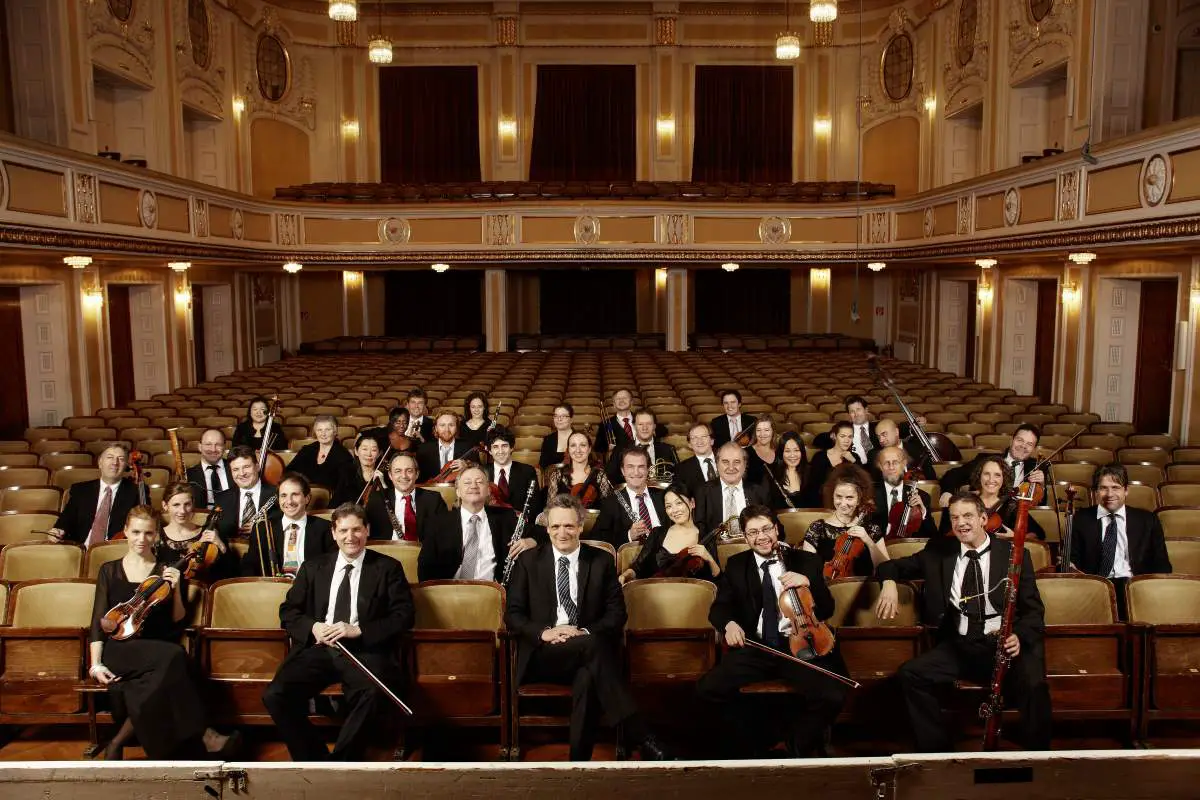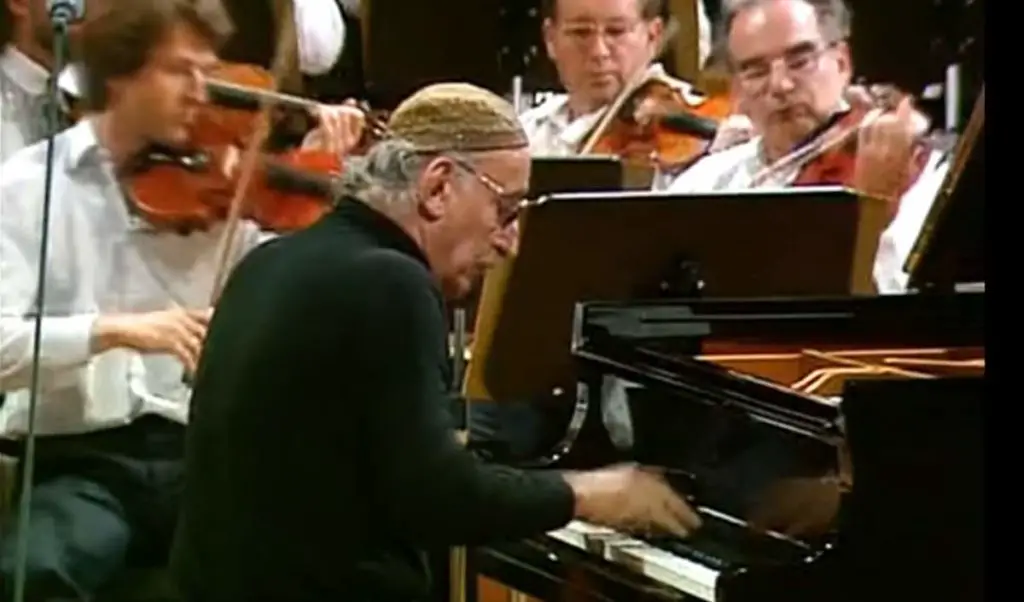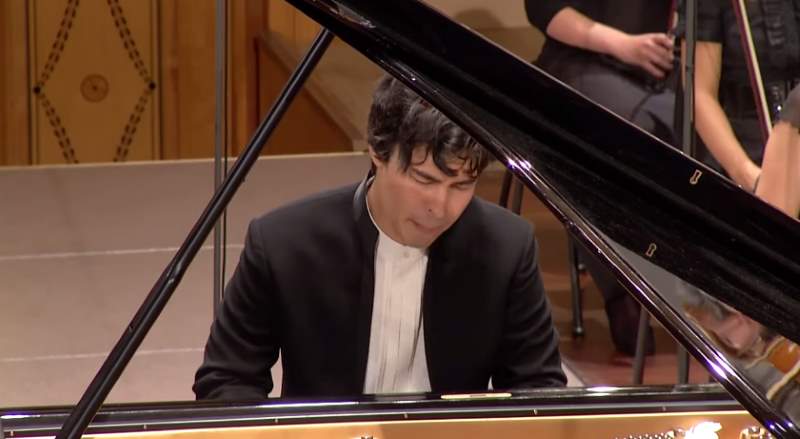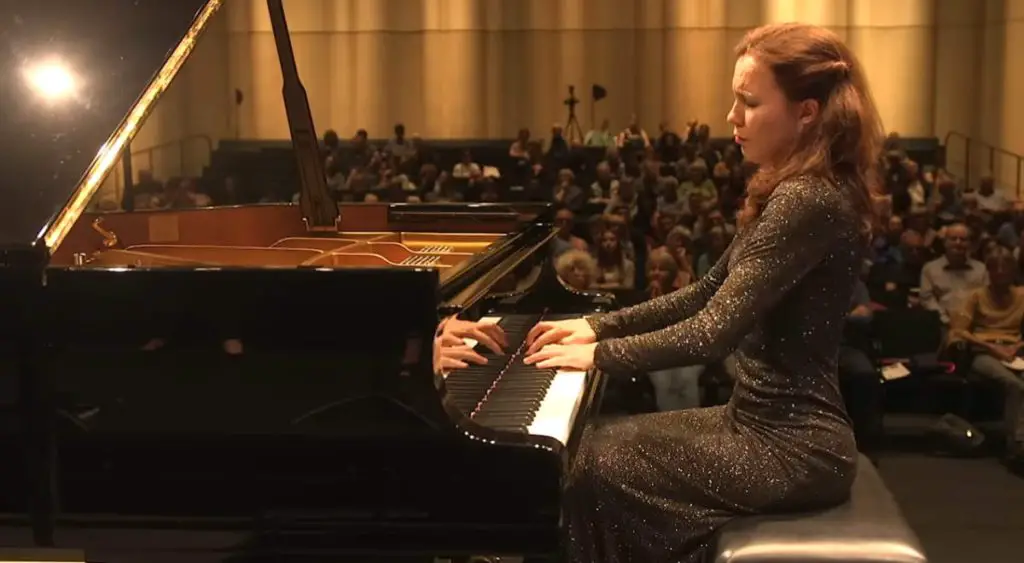Accompanied by the Austrian chamber orchestra Camerata Salzburg, Japanese-British classical pianist Mitsuko Uchida performs Wolfgang Amadeus Mozart’s Piano Concerto No. 20 in D minor, K. 466 with Ludwig van Beethoven’s cadenza. Uchida also conducts the orchestra. Recorded in March 2001 in Salzburg.
Mozart’s Piano Concerto No. 20
Wolfgang Amadeus Mozart’s Piano Concerto No. 20 in D minor, K. 466, stands as one of the most groundbreaking and influential works in the concerto repertoire. Composed in 1785, it remains a significant departure from the norms of its time, not least because it is one of the very few piano concertos Mozart wrote in a minor key. The choice of D minor imbues the piece with a darker, more dramatic tone than most other concertos of the era, a quality that attracted later Romantic composers such as Beethoven, who admired this work greatly and even wrote cadenzas for it.
At the time when Mozart wrote this concerto, the classical style was marked by clarity, balance, and restraint. While Mozart’s Piano Concerto No. 20 does adhere to the traditional three-movement structure commonly used in classical concertos, the emotional depth and complexity it offers defies convention. Its drama and intensity seem to foreshadow the emotional expansiveness of the Romantic era, making it a sort of bridge between Classical formality and Romantic expressiveness.
The orchestration in this concerto is rich and provides an intense backdrop against which the solo piano unfolds its narrative. Mozart incorporates the orchestra as an equal partner in the musical dialogue, moving beyond the mere accompanying role it frequently occupied in earlier concertos. The orchestral parts are characterized by their intricate counterpoint and dynamic contrasts, effectively amplifying the tension and drama inherent in the work. This calls for a keen sense of ensemble playing, both from the orchestra and from the soloist, to ensure that the intricate layers of musical dialogue are executed seamlessly.
Interestingly, the piece was composed in a period of extraordinary creativity for Mozart. The years surrounding its composition also saw the creation of some of his most celebrated operas, symphonies, and chamber works. The dramatic flair common to his operatic works of the period is evident in this concerto, most conspicuously in its emotional depth and the psychological intricacies it appears to explore. It’s as if Mozart channeled the same sense of drama that informed his operatic characters into the musical persona of this concerto, making it an emotionally rich and multifaceted work.
While the piece demands technical prowess from the soloist, it’s the interpretative challenges that often define the performances of this work. The soloist needs to navigate a complex emotional landscape that ranges from moments of quiet introspection to passages of high drama. It’s not merely a showcase for virtuosic technique but a platform for deep musical expression. The emotional and psychological nuances must be teased out and highlighted by the performer to fully realize the concerto’s transformative power.
In the broader context of music history, Mozart’s Piano Concerto No. 20 holds a special place not only for its undeniable quality but also for its influence on later composers. Its emotive force and structural genius served as a source of inspiration for musicians long after Mozart’s time, bridging the gap between the Classical and Romantic eras. Even today, it remains a cornerstone of the piano concerto repertoire, admired both for its historical significance and its enduring emotional impact.
Movements
1. Allegro
The first movement of Mozart’s Piano Concerto No. 20 in D minor, K. 466, is one of the most evocative and intense movements in the classical concerto repertoire. The movement is marked “Allegro,” but don’t let that fool you into thinking it’s simply a fast and cheerful piece. From the opening bars, Mozart plunges us into a world filled with dramatic tension, gravitas, and emotional complexity, very much in line with the qualities of the key of D minor.
The movement begins with a dark and brooding orchestral introduction that sets the stage for the entire concerto. The choice of D minor, a key often associated with emotional intensity and drama, is immediately felt. Even before the soloist enters, the orchestra gives us a taste of the rich tapestry of emotions that will be explored throughout the movement. The strings, woodwinds, and brass all contribute to this multidimensional picture, offering a textured and nuanced landscape over which the piano will soon weave its narrative.
When the piano finally enters, it does so with a sense of both delicacy and assertiveness. The solo part is, on one hand, incredibly lyrical, almost operatic in its expressiveness, and on the other, marked by moments of sheer technical rigor. Unlike some concertos where the soloist is the uncontested star of the show, here the piano frequently engages in meaningful dialogue with the orchestra. This interaction enriches the musical fabric and elevates the role of the orchestra from mere accompaniment to equal partner in a complex conversation.
One of the striking features of this movement is how Mozart treats thematic material. He introduces a handful of main themes but does not simply present them and move on; instead, he constantly develops, refines, and transforms them. This ongoing development gives the movement an organic quality, where musical ideas evolve naturally, almost as if they are characters in a drama undergoing their own arcs and transformations. This makes the music not just beautiful to listen to, but also intellectually rewarding to engage with.
The movement also incorporates many of the stylistic elements that are quintessentially Mozartian. There’s an unmistakable elegance in the melodic lines, a graceful symmetry in the phrasing, and an inherent sense of balance even amidst the drama. Yet, it is the emotional depth and the undercurrent of tension that make this movement stand apart from many of his other works. The interpretative challenge for the performer lies in capturing both the eloquent sophistication of Mozart’s style and the emotional intensity that is so unique to this particular concerto.
In essence, the first movement of Mozart’s Piano Concerto No. 20 is a masterclass in emotional storytelling within the bounds of classical form. It balances the grace and symmetry typical of the classical era with an emotional depth that looks forward to the Romantic era. It offers a demanding role for the pianist, not just technically but also emotionally and intellectually, requiring a nuanced understanding of both the architecture and the emotive language of the music. It’s a movement that captivates audiences not just through its technical brilliance but through its power to convey a wide range of human emotions, making it a lasting favorite in the piano concerto repertoire.
2. Romanze
The second movement of Mozart’s Piano Concerto No. 20 in D minor, K. 466, marked “Romanze,” offers a poignant and contrasting mood to the intense drama of the first movement. It serves as an emotional sanctuary within the concerto, a place for reflection and introspection. Composed in the key of B-flat major, this movement provides a significant tonal contrast, delivering a sense of warmth and emotional respite.
The term “Romanze” typically signifies a lyrical, song-like quality, and Mozart doesn’t disappoint here. The movement opens with an incredibly tender, almost ethereal melody that immediately conveys a sense of tranquility. The piano introduces this theme, capturing the listener’s attention with its simplicity and emotional directness. This main theme is the anchor of the movement, a melodic oasis to which we return repeatedly, each time with a renewed sense of emotional insight.
Yet, even in this quieter movement, Mozart plays with contrasts. The central section shifts the mood dramatically. Moving into G minor, Mozart introduces a darker, more agitated theme that is worlds apart from the serenity of the opening. The orchestration becomes denser, and the harmonies more complex, indicating an emotional turbulence that disrupts the pastoral calm. This contrasting section serves as a reminder that even in moments of peace, complexities and emotional intricacies are never far away.
As quickly as this agitation appears, it dissipates, and we return to the original theme and key of B-flat major. The reprise of the main theme brings a feeling of resolution and completeness, but it’s a nuanced resolution, colored by the emotional journey we’ve undertaken. When the theme returns, it seems to carry the memory of the darker section within it, making its final iteration profoundly moving.
The relationship between the piano and the orchestra in this movement is more collaborative than confrontational. They often share thematic material, echo each other’s sentiments, and join together in fortifying the emotional messages of the movement. Unlike the first movement, where tension and drama are at the forefront of the dialogue between piano and orchestra, here they collaborate to create a unified emotional space, each enriching the other’s expressive potential.
Technically, the second movement may not present the same level of difficulty as the first, but emotionally and interpretatively, it is equally challenging. The performer must transition seamlessly between the movement’s contrasting moods, ensuring that each is fully realized while maintaining an overarching sense of cohesion. Capturing the emotional subtleties is crucial, and the pianist has the task of drawing out the complexities hidden within the movement’s seemingly simple melodies.
3. Allegro assai
The finale of Mozart’s Piano Concerto No. 20,
marked “Allegro assai,” is an exhilarating ride that serves as a fitting conclusion to the emotional journey set forth in the preceding movements. Returning to the home key of D minor, this movement strikes a balance between the intense drama of the first movement and the lyricism of the second, while introducing its own sense of rhythmic vitality and thematic inventiveness.
The movement opens with an energetic, almost restless theme that immediately captures the listener’s attention. The sense of urgency is palpable, reinforced by the driving rhythms and dynamic contrasts. Unlike the contemplative second movement, the third is action-packed and offers little room for introspection. It’s as if the emotional tensions and complexities explored earlier are now funneled into a musical resolution, achieved through a flurry of virtuosic passages and vibrant orchestral textures.
In this movement, Mozart showcases his knack for developing thematic material in clever and unexpected ways. Themes are introduced, fragmented, and developed with an agility that keeps the listener constantly engaged. Mozart employs a rondo-like form, but he does so with enough variation and surprise to make it uniquely his own. This cyclical form allows the main theme to return multiple times, each instance varied but recognizable, serving as a recurring musical landmark throughout the movement.
The interaction between the piano and the orchestra continues to be a significant feature, but here it often takes on the character of a spirited chase or a playful game. The soloist is frequently given the role of initiating thematic statements, only for the orchestra to pick them up, modify them, and throw them back, creating a lively dialogue that is both entertaining and musically satisfying. The orchestra is far from a passive participant; it actively contributes to the unfolding drama, sharing the spotlight with the piano in a balanced interplay.
Technically, the movement is a tour de force, requiring the pianist to display not just speed and precision but also a deep understanding of the piece’s structure and emotional undertones. There are rapid scales, intricate passages, and challenging leaps for the soloist, making it a technically demanding piece. Yet, beyond the technical fireworks, the performer must also capture the nuanced shifts in mood and character that give the movement its depth.
As the movement approaches its conclusion, there is a sense of accumulated tension finally reaching a breaking point. Mozart gradually builds up to a powerful climax, where both piano and orchestra join forces in a grandiose display of musical prowess. The concerto ends with a flourish, resolving the harmonic and emotional tensions in a manner that leaves the listener both exhilarated and deeply satisfied.
Mitsuko Uchida
Mitsuko Uchida was born in 1948 in Atami, a seaside town close to Tokyo, Japan. She has appeared with most of the world’s foremost orchestras, recorded a wide repertory with major labels, won numerous awards and honors (including Dame Commander of the Order of the British Empire in 2009), and serves as co-director of the Marlboro Music School and Festival. In recent years, she has also conducted major orchestras.

Camerata Salzburg
The Camerata Salzburg is an Austrian chamber orchestra based in Salzburg, Austria. The Camerata’s principal concert venue is the Mozarteum University.
Camerata Salzburg was founded in 1952 by teachers and students of the Salzburg Mozarteum. The ensemble was able to quickly establish itself, with its Mozart Matinees soon becoming the cynosure of the Salzburg Festival. The founding father of the Camerata was conductor, music pedagogue, and musicologist Bernhard Paumgartner who had also been co-founder of the Salzburg Festival and later went on to be its president. When founding the Camerata, Paumgartner sought to preserve as well as revive the ethos of classical and classicistic music.
The name of the orchestra, originally Camerata Academica of the Mozarteum Salzburg, was chosen to pay homage to the historical Camerata Fiorentina of the Renaissance. Then, as now, the focus of the musicians was to independently make music with a sense of community. The Camerata Salzburg concentrates on the traditional chamber orchestra repertoire.

The musicians play both under conductors, under the direction of soloists, and concertmasters alike, also performing in smaller chamber music formations. Naturally, the works of the Salzburg-born musical prodigy Mozart, as well as the music of Haydn, Beethoven, and Schubert were instantly the core of the Camerata’s repertoire. Within the setting of their Mozart Matinees at the Salzburg Festival, the Camerata played many symphonic works and gave numerous concert performances of Mozart’s operas, thereby shaping the unique “Salzburg Mozart sound”, a sound, which is as recognizable as it is ever-evolving.
Since 1956, when the first Mozart Week was held in Salzburg, the Camerata has also focused within this festival on the repertoire of the First Viennese School. From the very beginning, the orchestra has included opera in its repertoire.
The further development of the orchestra after the Paumgartner era was entrusted to the artistic director Antonio Janigro, under whom in 1974 the first subscription concert series of the Camerata took place. One of the soloists of that period was violinist Sándor Végh, who took over the artistic leadership of the ensemble in 1978 parallel to his duties as a pedagogue at the Salzburg Mozarteum. He successfully integrated excellent young musicians into the Camerata. Végh realized the idea of performing string quartets in larger settings, which encouraged each musician to individually develop whilst simultaneously benefiting the collective.
Under Végh the ensemble expanded its chamber orchestra repertoire to the Romantic era (e.g. Mendelssohn Bartholdy, Brahms, Dvorák, Tchaikovsky) and to 20th-century classical music (e.g. Bartók, Strawinsky, and Schönberg). Furthermore, the Camerata has initiated its own Festival “Begegnung” (“The Encounter”), and since 1987 has been programming its own concert series at the Konzerthaus in Vienna.
Starting in 1993, the Camerata has once again performed operas at the Salzburg Festival (“Lucio Silla”, “La Clemenza di Tito”, “Le nozze di Figaro”, and “The Rake’s Progress”, amongst others).
On the occasion of the Mozart Week in 1997 Sir Roger Norrington joined the Camerata for the production of Mozart’s “Mitridate, Re di Ponto”, replacing the late Sándor Végh as principal conductor. As a result of this collaboration, Sir Roger Norrington was appointed as chief conductor and held this position from 1998 until 2006. During this period, he enriched the characteristic style of the ensemble with his experience in historically accurate performance practice. In recognition of their achievements, the Salzburg Festival granted the Camerata and Norrington their own concert series.
In 2007 Norrington’s assistant director, violinist Leonidas Kavakos, took over the artistic direction of the orchestra until 2011, when Louis Langrée was appointed principal conductor. Langrée’s musical leadership and choice of repertoire show great congruency with the Camerata’s inclinations, without lacking refreshing inspiration. Thus, even in its seventh decade, the Camerata displays a “contagious musical enthusiasm” (Neue Zürcher Zeitung).
Sources
- Piano Concerto No. 20 (Mozart) on Wikipedia
- Mozart: Piano Concerto No. 20 in D minor, K. 466 on the Boston Symphony Orchestra’s official website
- “Mozart – Piano Concerto No. 20 in D minor” on the Classic FM website
- Piano Concerto No. 20 in D minor, K. 466 (Mozart, Wolfgang Amadeus) on the International Music Score Library Project website
- “Mozart: Piano Concerto No. 20 in D minor, K. 466” on the L.A. Phil website
- Camerata Salzburg on Wikipedia
- Mitsuko Uchida on wikipedia
- camerata.at



